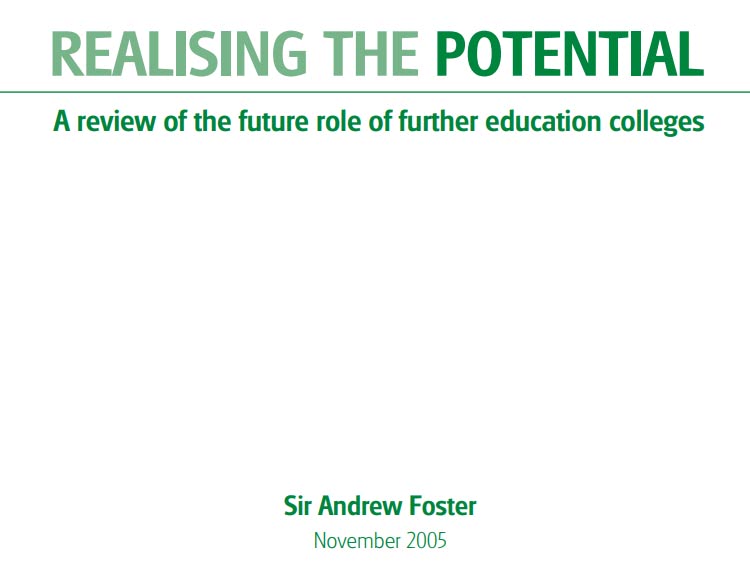Sir Andrew Foster’s Long – Awaited Review Calls for Skills Focus

The long wait for the first comprehensive review of FE Colleges and the future of the sector finally draws to a close today with the publication of the Foster Review, “Realising the potential : a review of the future role of further education colleges“.
The Review was brought into operation last November (2004), when Sir Andrew Foster was invited by the Secretary of State for Education and Skills, and Chair of the Learning and Skills Council (LSC) to carry out a review of the future role of FE colleges. This review has been conducted with openness and consultation at its core, with contributions from across the FE sector, and has considered issues raised by the reform agenda for the sector.
Skills for the Nation
The Review has taken a meticulous approach over the past few months in consulting specialists from across the FE sector. Foster will say later today that whilst he does not belittle the contribution and importance of traditional socially motivated training, the focus for the next decade must be more precisely turned upon skills training for the economy’s needs in the coming years.
This marks a notable stance in view of the upcoming Leitch Review, commissioned by the Chancellor of the Exchequer Gordon Brown MP to establish the skills that will be needed by the workforce in 2020 for the UK to be strong and competitive. Sir Andrew Foster and Sir Sandy Leitch are understood to have consulted each other in the composition of their separate reviews, to ensure that these two significant reviews of the FE sector are not at odds.
Reforming Centralised Control Mechanisms
It was expected by many that the Review would have a stance on the bureaucratic governance of much of the sector. The Learning and Skills Council (LSC) was expected to bear a large share of the criticism, and has already made efforts to cut its administrative budget and thus divert a greater degree of the budget allocated to FE directly to frontline provision. The Review calls for this to continue, and is critical of the overly complicated mechanisms that rule over the sector.
Colleges, too, will be called to do more in striving to meet the demands not only of the learners but also of business and strategic partners, and will be expected to make further efforts to meet the demands of their own workforce. The colleges, according to the Review, will be at the frontline of skills training to meet the growing challenge of the skills gap as noted by the Confederation of British Industry (CBI) amongst others.
Now that the Foster Review has finally spoken, it remains to be seen what will happen next. Each of those affected by the report will obviously have a response from their own particular standpoint. One of the most interesting responses will be delivered tomorrow at the Association of Colleges (AoC) Conference, where the Secretary of State for Education, Ruth Kelly MP, will be speaking to delegates. Sir Andrew Foster has given us his conclusions; now, will the Government take them into consideration, or will they suffer the same fate as the Tomlinson Report?
Jethro Marsh











Responses